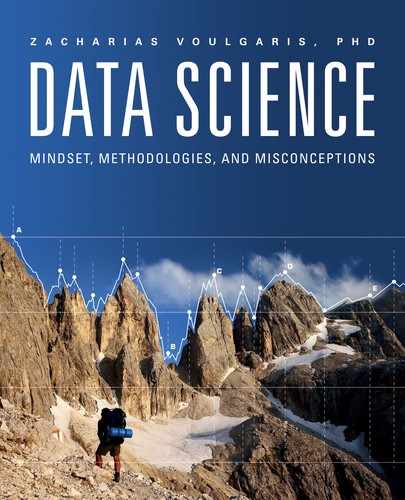Final Words
In this book, I made an effort to help you enhance your perception and understanding of data science. It is my hope that you can use this knowledge to improve your data science work or to identify areas of the field where you would like to focus. At the very least, I hope you enjoyed it and had an opportunity to think about data science in an open-ended way, much like the pioneers of the field did, as well as many others currently making their way in the world of data science.
These days, many people want to reduce data science to a set of processes that can be automated or at least semi-automated through a series of high-level tools. Although this can sound attractive as an idea, it may be the case that such a task would be an oversimplification of data science and perhaps even a dangerous feat, as the mindset that makes the field meaningful may be lost in the process (not to mention the responsibility aspect of the role). I am not saying that you need to suffer doing a lot of tedious tasks (particularly in the data engineering part of the pipeline), but to merely be wary of people who misguidedly promise to automate everything, likely without having thought it through. Certain things will no doubt become automated, but the principles of data science and the core ideas of the craft will not. If automation was as easy as some people make it out to be, then no one would bother to learn calculus, for example, since there are programs out there that can undertake any calculus-related task, be it through processes of abstract mathematics or via a simulation.
Data science technologies will change in the next few years, and they will continue to change just like in any technology-related field. New theories will come out and make some of the existing methods obsolete. Yet, just like a robust generalization, if your understanding of the field is solid, no amount of change can shake that from you. You may need to adapt your way of performing certain tasks by adopting new methods and techniques, but you will still be able to offer value to an organization. Perhaps your soft skills (the part of your skill-set that is not technical or scientific) will become your key selling point, or maybe your analytical thinking will be what makes your an asset as a data scientist. Whatever the case, the more detached you become to the technologies themselves through a mature assimilation of the know-how and a more creative approach to dealing with the problems at hand, the better off you will be.
In this book, I tried to get this message across, along with the idea that the value of data science lies in what you can do, regardless of the tools you use. Mastery of the tools may be useful career-wise, but not the most essential part of the craft. This is why I did not emphasize the specifics of the various tools. After all, if there is one thing that remains relevant while time gradually makes our tools feel rusty and eventually obsolete, it is the data science mindset. Hopefully, this book has helped you gain a better glimpse of it and maybe even some insight on how you can expand your mind to include it. If that’s the case, then you will be able to see meaning and elegance in the data as it gradually morphs into information, releasing the signal from the noise that surrounds it. If not, then you can at least draw some inspiration from all this, to find your own meaning in this great line of work and generate elegant insights in the process. It really is up to you.
